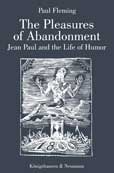

Paul Fleming
The Pleasures of Abandonment
Jean Paul and the Life of Humor
This study examines Jean Paul’s notion of humor in the light of recent scholarly debates concerning irony and German Romanticism. Irony has become one of the master tropes of literary studies, the linguistic figure that at once enables and destabilizes language, knowledge, and the subject. Jean Paul’s humor differs from Romantic irony, because its focus is not primarily language but the lived experience of time and, in particular, the anthropological fact of death. Humor lingers in the face of death in order to learn how to extract joy from it. Jean Paul explicates this process of finding pleasure in abandoned finitude through one of the more sober but spectacular delineations of art: „Poesie erleuchtet wie Feuerwerk, will aber die Nacht nicht vertreiben, sondern benutzen.“ One finds in this compact definition neither a great epochal theory of art – no renewals of society (Schiller), no infinite approximation (Schlegel) – nor any claims to the end of art (Hegel). Rather, literature operates via a contrast in and against the darkness of finitude; it makes the night enjoyable, without ever turning it to day. Jean Paul’s work thus prefigures Freud’s conception of black humor, which is not resigned but rebels in the name of the pleasure principle against life’s suffering. With Jean Paul, humor becomes the joyful science of a melancholic life.
Der Autor
Paul Fleming is Assistant Professor of German at New York University. He has published numerous articles on 18th and 19th century literature as well as on 20th century literary criticism. His current project examines the aesthetic and political valances of the terms „average“ and „mediocre“ in the age of democracy.
172 Seiten, Broschur mit Fadenheftung
Format 23,5 x 15,5 cm
noch nicht angeboten, bereits erschienen
€ 26,00 / SFr 45,50
ISBN 3-8260-3247-0
| >> Bestellen k | >> Zurück | >> Zurück zur Übersicht |